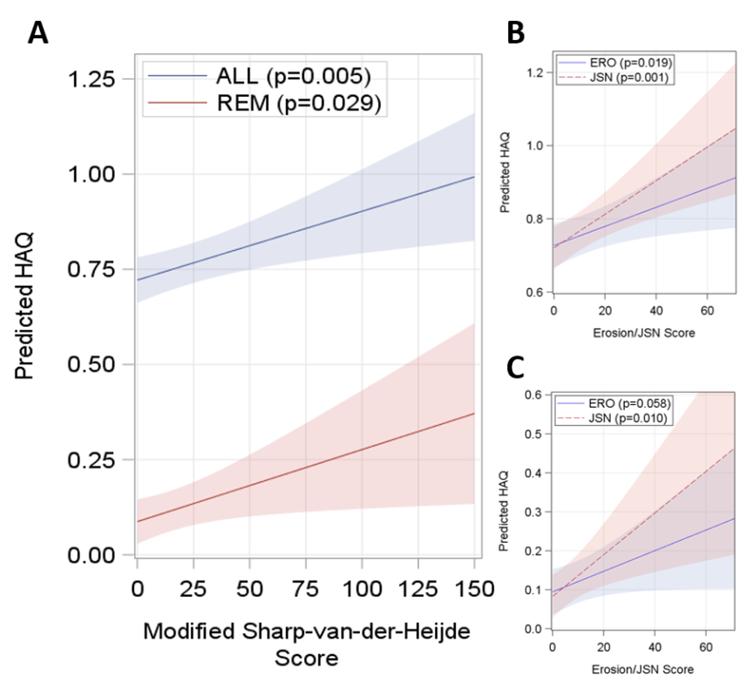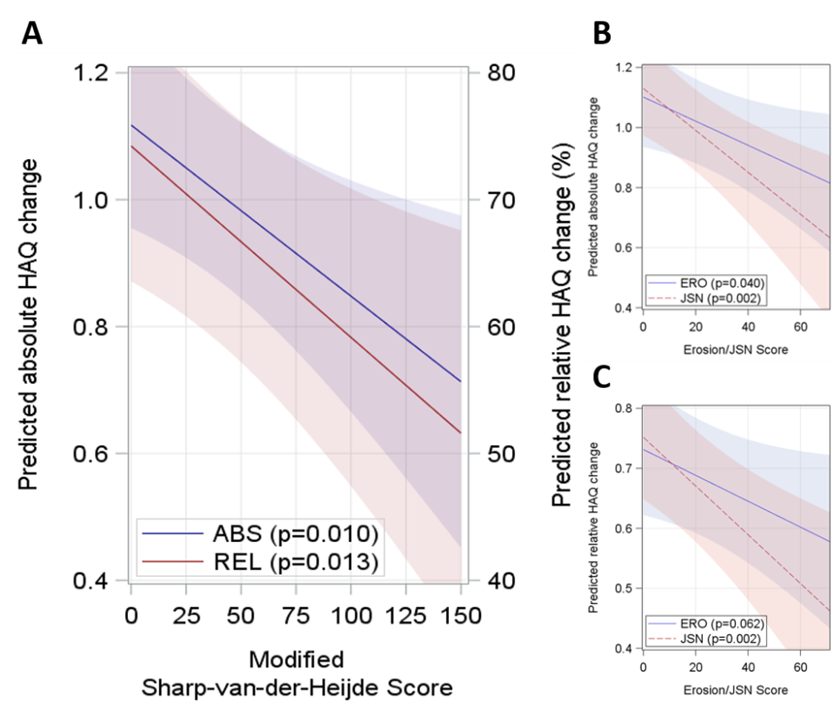Session Information
Session Type: ACR Poster Session C
Session Time: 9:00AM-11:00AM
Background/Purpose:
Functional outcomes are central in patients with chronic inflammatory musculoskeletal diseases. In a secondary data analysis of the GO-REVEAL trial we investigated if structural damage is linked to functional impairment in patients with psoriatic arthritis (PsA).
Methods:
We analyzed data of patients enrolled in the GO-REVEAL trial including modified Sharp-van-der-Heijde X-ray -scores for PsA (mSVDHS) performed at weeks 0, 24, 52 and 104 (n=363). In longitudinal data analyses, all patients and patients in Disease Activity index for PSoriatic Arthritis (DAPSA) remission (n=117), utilising all remission visits (REM; DAPSA <4), we used the HAQ as dependent variable and total mSVDHS, joint space narrowing (JSN) and erosion (ERO) scores, respectively, as independent variables. To analyse effects of structural damage on the potential to improve physical function, we identified a subgroup of patients who had major functional limitations at baseline (HAQ≥1) and showed a major DAPSA-response. In this model we assessed the effect of mSVDHS on changes in HAQ (n=67). As validation cohort, we analyzed routine PsA patients from our clinic with complete cDAPSA (DAPSA without CRP) and mSVDHS (n=160).
Results:
As visualised in figure 1, mSVDHS (panel A) JSN and ERO (panel B+C) had significant effects on HAQ in all patients (ALL) and patients in REM.
In the second analysis (figure 2), in patients achieving DAPSA major response, results were significant for the association of mSVDHS and JSN with relative (REL) and absolute (ABS) HAQ changes (panel A). Additionally, higher estimates of JSN, compared with erosion scores could be observed, with absolute (B) and relative (C) HAQ change as outcome parameter.
These results could be confirmed in the validation cohort and in analyses using the SF-36 Physical Component Score instead of the HAQ as outcome variable in GO-REVEAL patients.
Conclusion:
Our results reveal that responsiveness of functional impairment decreases with increasing joint damage. They further suggest that JSN is functionally more important than erosions. Both, achievable HAQ levels and HAQ responses are negatively impacted by a high degree of structural damage. Consideration of these components is clinically and therapeutically relevant, as the HAQ component related to inflammation is expected to be reversible, while that related to damage is not.
Figure 1.
Figure 2.
To cite this abstract in AMA style:
Kerschbaumer A, Supp G, Smolen JS, Aletaha D. The Effects of Structural Damage on Functional Disability in Psoriatic Arthritis [abstract]. Arthritis Rheumatol. 2017; 69 (suppl 10). https://acrabstracts.org/abstract/the-effects-of-structural-damage-on-functional-disability-in-psoriatic-arthritis/. Accessed .« Back to 2017 ACR/ARHP Annual Meeting
ACR Meeting Abstracts - https://acrabstracts.org/abstract/the-effects-of-structural-damage-on-functional-disability-in-psoriatic-arthritis/


